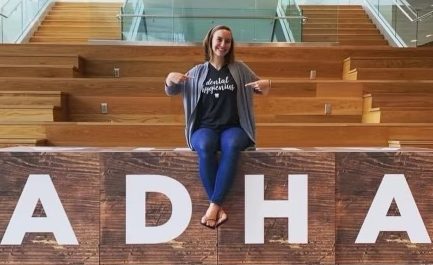Dental Hygiene from Peru to the Pandemic

Photo credit: Ashley Wheeler with the American Dental Hygienists Association sign. Photo credit: Ashley Wheeler
May 11, 2022
“It is important to me, and even more so now, that everyone has access to dental care,” said Ashley Wheeler, a dental hygienist who works for Timberlane Dental Group.
The Mercury recently interviewed Wheeler about her work through the pandemic and her past work, during college, when she helped in Peru providing dental care for impoverished communities.
“I work on the pediatric side of the group. I see young children, college-aged adults and special needs adults,” Wheeler said.
When asked about her day, Wheeler said that she usually has about 30 minutes before her first patient to prepare and review charts for the day. The day starts at 8 a.m. with 30-minute, 45-minute, and one- hour appointments depending on what the patient is scheduled for. She sees around five to eight patients in the morning shift. The afternoon shift of the day usually has four 45-minute appointments or three one-hour appointments. When the day is over, they restock rooms and clean their tools.
When asked about the effect of Covid within the office, Wheeler said, “Unfortunately the masks sometimes can make it difficult to hear each other…luckily I have a pretty loud voice.”
She added that the bigger change for everybody in the office is that they have to wear masks at all times, instead of just when seeing patients. She said that she expected more of an impact on her younger patients, but it seems that they have remained undisturbed by the mask-wearing.
Dentists have always worn masks around their patients, but her office has added a few things to their attire.
“We usually wear lab coats, masks, gloves and eye protection. Now we added face shields and surgical caps to cover our hair from aerosols that may be produced from procedures. The procedures that create aerosols are ultrasonic scalers, sealants and restorative procedures,” Wheeler said.
Unlike what many may expect, Wheeler said that they have actually had much more business lately, even during the pandemic. People stayed home during the intense lockdowns and canceled their appointments; many have waited for almost three years.
“We have been very busy, and there are lots of people who are overdue because of Covid. Lots of dentists and hygienists who were close to retirement age left earlier. It has added to the already decreased numbers of hygienists and dentists in our region and, really, across the country,” Wheeler said.
When asked about her background in dental hygiene, Wheeler said that, while attending Vermont Technical College, she traveled with a group called MEDLIFE to Cusco, Peru, with other dental hygiene majors and some nursing majors.
She said the clinics that they volunteered for provided, dental, pharmaceutical, medical and OBGYN services for impoverished areas. Many of the communities weren’t able to afford, or travel for, their medical needs.
“While helping the MEDLIFE staff, we also helped a family build a fence for their farm and paint their house,” Wheeler said.
One of her most memorable experiences, she said, was in one of her favorite towns that they went to. Her group only had supplies for one more patient, and the community put aside their needs for a young teen boy.
“His family was so grateful to have a few of his teeth fixed; that [could have been] very painful and possibly life-threatening for this young man,” Wheeler said.
Wheeler added that something that amazed her during the trip was that many procedures, besides extractions, were done without anesthesia because their supplies were limited. The towns were still just as grateful to be helped. Although they didn’t have general dental cleanings, they did have a station for oral hygiene with handouts and supplies.
“The kids loved our station,” Wheeler said.
She added, “Insurance in this country is complicated, expensive and often drives the cost of dental work. Even preventative care is often neglected because of the cost. My trip to Peru made me more aware of my values when choosing a place to work. I want to work for dentists that allow me to do that in my profession and feel the same way.”

Louise May Thompson • May 11, 2022 at 5:04 pm
Thank you for writing this article. It was very informative and interesting. I am glad that Ashely Wheeler is a dental hygienist in St.Albans, Vermont.